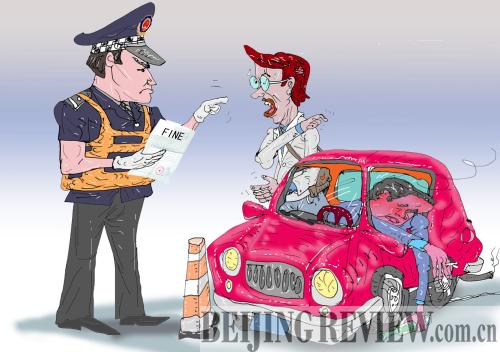|
 |
|
LI SHIGONG |
In late September, China's Ministry of Public Security expanded its nationwide campaign against drunk driving by releasing a document suggesting that passengers sharing a car with a drunk driver be punished together with the driver and that passengers who do not prevent drunk driving be fined.
Statistics from the Ministry of Public Security show that in 2007 and 2008, respectively, 3,435 people and 3,060 people lost their lives to drunk-driving accidents.
The public applaud the recent tough actions against drunk driving, but most people are opposed to a penalty for passengers. According to a survey conducted by Web portal Sina.com, about 30 percent of respondents believe that passengers should be penalized and have the obligation to supervise drivers, while 60 percent oppose the idea. Besides, 21 percent of respondents said it is sometimes impossible to tell whether drivers have consumed alcohol or not.
Even some legal experts argue that, although the police authorities' proposal reflects the urgency and determination to crack down on drunk driving, penalizing passengers seems to go too far. For a citizen to be penalized, he (she) must have violated the law. As far as passengers go, they share a car with a drunk driver but are not driving themselves, nor have they encouraged anyone to drive under the influence. Therefore, to punish them is legally groundless.
Everyone is responsible
Li Kejie (xinhuanet.com): We should not take drunk driving as a mere offense, but a kind of transportation activity as a whole. The transportation activity, of which the passengers are a part, breaks the law. In this sense, the passengers must be held accountable. Common sense suggests that passengers don't have an obligation to stop drunk drivers from driving. But if someone knowingly rides in a car with a drunk driver, they are aiding and abetting a crime. Moreover, drunk driving is a serious offense that endangers public safety; the more passengers there are, the more lives are at risk. For this reason, it is necessary and rational to impose a light punishment on passengers while increasing the punishment for drunk driving.
Yang Tao (Shanghai Morning Post): To punish passengers who share a car with a drunk driver is to assume their joint liability. The passengers should be responsible for dissuading the drunk driver from driving.
Nowadays, as the number of cars on the road rapidly increases and drunk driving becomes a major threat to public safety, it is necessary to make its prevention a legal responsibility of passengers, rather than a moral one.
For example, Japanese laws stipulate that the passengers and drinking companions of drunk drivers can be imprisoned for up to three years or fined up to 500,000 yen ($5,500). Some U.S. states also stipulate that anyone who serves alcohol to an on-duty driver can be held responsible.
According to official statistics, at the end of last September, China had 16.8 million registered vehicles, and in 2008 alone there were 265,204 traffic accidents, causing 73,484 deaths and 304,919 injuries. These numbers indicate that China has become an auto society. To ensure public safety, everyone using a car should take on more responsibilities. This includes passengers, who should be legally required to dissuade drunk drivers from driving.
As a matter of fact, it is practical for passengers to do so since most passengers and drivers know each other. If passengers indulge a drunk driver in driving, they actually increase risks for the public and therefore deserve a penalty.
Liang Jiangtao (jx.xinhuanet.com): Even children know that people should warn drunk drivers against driving. It demonstrates awareness of citizen obligations.
If passengers fail to dissuade someone from driving drunk, they should not ride in that car. It is simple self-defense. But the fact is that now, few people dissuade drunk drivers from driving and some even encourage drivers to drink. Obviously, moral education has failed, so the state has to turn to legal measures. Only through tough penalties can China promote awareness of citizen obligations.
| 